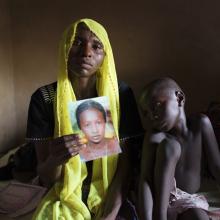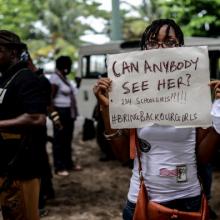#bringbackourgirls
Boko Haram has freed 21 of more than 200 girls kidnapped by the Islamist militant group in April 2014, in the northern Nigerian town of Chibok, the [Nigerian] government said on Thursday.
Around 270 girls were taken from their school in Chibok, in the northeastern Borno state, where the jihadists have waged a seven-year insurgency to try to set up an Islamic state, killing thousands and displacing more than 2 million people.

Rebecca Samuels. Image via On Scripture.
Too often in the biblical witness, violence against women and girls focuses disproportionate energy on the feelings and actions of men. King David is furious. Absalom feels hatred. And the desolate Tamar is instructed to be quiet. Her rapist was, after all, her kinfolk, her half-brother, a member of her tribe.

Image via REUTERS/Joe Penney/RNS
Two years after the abduction of nearly 300 Chibok schoolgirls by Boko Haram militants in northeast Nigeria, some parents are still hoping their daughters will one day be rescued. But some church leaders there are concerned that the authorities have not done enough to rescue the girls, who were ages 16 to 18 at the time of the kidnapping on April 14, 2014. About 50 of the girls escaped, but 219 remain missing.
Five hundred days in captivity is a long time for anyone, let alone teen girls. But this is exactly the case for 219 students kidnapped and still missing. Under the cover of darkness on April 14, 2014, the terrorist group Boko Haram, dressed as military soldiers, abducted 276 female students from the Government Secondary School in Chibok, Nigeria. They plundered and burned the school to the ground and forced the young girls into large trucks. A total of 57 girls escaped on their own, but 219 grieving families still await news of their daughters' fate. Based on the reports of other Boko Haram abductees, it's believed the Chibok girls have been sold as child brides, forced into sexual slavery, turned into unwilling weapons of terrorism. Shocking revelations ... as this story has virtually disappeared from the headlines.
What if this had happened in the United States or Europe?
Five hundred days in captivity is a long time for anyone, let alone teen girls. But this is exactly the case for 219 students kidnapped and still missing. Under the cover of darkness on April 14, 2014, the terrorist group Boko Haram, dressed as military soldiers, abducted 276 female students from the Government Secondary School in Chibok, Nigeria. They plundered and burned the school to the ground and forced the young girls into large trucks. A total of 57 girls escaped on their own, but 219 grieving families still await news of their daughters' fate. Based on the reports of other Boko Haram abductees, it's believed the Chibok girls have been sold as child brides, forced into sexual slavery, turned into unwilling weapons of terrorism. Shocking revelations ... as this story has virtually disappeared from the headlines.
What if this had happened in the United States or Europe?
One year after the kidnapping of 276 Nigerian schoolgirls by terror group Boko Haram, more than 200 kidnapped children remain missing.
The kidnapping on April 15, 2014, provoked international outrage and a viral twitter hashtag, #BringBackOurGirls. Many prominent personalities — including First Lady Michelle Obama and comedian Ellen DeGeneres — joined the global outcry, prompting Nigeria to launch a military offensive against the group. Also in the last year, the U.S. military and others have offered Nigeria assistance in finding the children.
But few children to date have escaped from what is widely counted among the most ruthless terror groups operating in North Africa.
According to NBC:
"The Chibok girls were just one group of many, many others who have been kidnapped since last year," said Biu, a woman's rights activist and professor in Maiduguri, Nigeria. "I cannot say that the #BringBackOurGirls campaign has made women and young girls in the northeast feel any safer."
While a few dozen of the Chibok girls have escaped Boko Haram captivity, more than 200 are still missing. To Biu, the international campaign to release the girls did little to bring them home — or stop countless others from being taken since.
Since then, NBC reports, Boko Haram's campaign of terror has continued "largely unabated."
Read more here.
“What did you do on your summer vacation?”
Even now students may be answering that question in essays at the start of this new school year. Maybe you wrote such a paper years ago. No matter what you did or where you went this past summer, it was almost impossible to escape the heaviness of the headlines. #BringBackOurGirls has become a distant refrain, almost forgotten beneath the crush of summer tragedies:
Thousands of children traveled alone from Central American countries to enter the U.S. as refugees. Ebola deaths spread to more West African nations killing hundreds including many health workers. The forces of ISIS, intent on carving out an Islamic caliphate, took over major Iraqi cities and beheaded a U.S. journalist in Syria. Russia usurped Crimea and threatened the rest of Ukraine. The U.N. refugee agency announced in late August that “the number of refugees, asylum-seekers and internally displaced people worldwide has, for the first time in the post-World War II era, exceeded 50 million people.” Gaza has been reduced to rubble while Hamas rockets still fly toward Israeli cities. Michael Brown, an eighteen-year-old African American man who might have started college this week, was shot and killed by a white police officer in the waning days of August.
After such a summer, how can we do anything but scoff at Paul’s words from Romans?
Can you imagine sitting in a public space and all of a sudden everyone around you starts to speak in a different language? And yet somehow you still understand them? Can you imagine the cacophony of sounds this event would cause? Can you envision the power it would take to make this astonishing moment happen?
Is it a miracle? Possession? Paranormal activity? It likely would freak you out.
This moment actually happens more often than we think. A glimpse of this cacophony of sounds can be found in our everyday lives. We hear loud voices coming through network and cable news shows, on Twitter and Facebook, and through other social media outlets. We hear rising decibels of chatter around social justice issues — from the right and from the left — about issues as diverse as abortion, same-sex marriage, income inequality, biblical obedience, or defining traditional values. We hear the noise. At times, it is almost deafening. The voices seem to fly past each other so fast that neither side seems to be listening to the other at all.
But then there are moments when we all come together to speak for one common purpose.
The recent focus on the kidnapped girls in Nigeria shines a light on the suffering of women and girls all around the world.
Perhaps it is due to my ongoing fascination with Jewish and Christian apocalypses that the motif of suffering is constantly on my mind. I am always struck with John the Seer’s words of praise and encouragement in his letters to the seven churches of the Apocalypse that are patiently enduring persecution, affliction, distress, and tribulation.
It seems that from a Christian perspective, suffering is to be expected and just part of the deal of Christian membership — a real scriptural blow to prosperity gospels! Thus it should come as no surprise to us when the letter of 1 Peter 4:12-14 and 5:6-11 emphasizes the same themes of present suffering as a marker for future reward.
I was born in 1990. That puts me squarely in the middle of what is referred to as the millennial generation.
It also, apparently, makes me a lazy, entitled, narcissist who still lives with my parents.
But that’s beside the point. What’s more important about the date of my birth is that it places me at a distinct and pivotal point in human history: I grew up with the Internet — what they call a “digital native.”
I (vaguely) remember when the Internet got popular; having slow, dial-up that made lots of crazy noises whenever you wanted to use it; talking to other angsty teens on AOL Instant Messenger (“AIM”); downloading music on Napster and Kazaa; and then, slowly but surely, having the Internet became engrained in my everyday life as if it was there the whole time.
But, like the bratty sibling I grew up with (upon reflection, I was equally, if not more, bratty — #humility #perspective), I’ve recognized that I have a love/hate relationship with the Internet. It’s a game-changer for the human experience, so, like that sibling, I think I’ll always love it. But, for every positive, innovative element of the Internet there is an equal and opposite reaction.
On April 15, terrorists from Boko Haram abducted more than 200 Nigerian girls sleeping in their high school dormitory. The girls awoke to a nightmare of violent gunfire as the terrorists forced them into their vehicles and vanished.
Recently the leader of Boko Haram has garnered media attention with his video arrogantly taking credit for the kidnapping. He added a religious element to his repulsive actions:
“I abducted your girls. I will sell them in the market, by Allah. There is a market for selling humans. Allah says I should sell. He commands me to sell. I will sell women.”
Omid Safi, professor of Islamic Studies at the University of North Carolina at Chapel Hill, wrote an impassioned response to Boko Haram’s leader that speaks for me: “Human beings are not for sale…This is the bastardization of Islam, of decency, of liberation, of all that is good and beautiful.”
The first time I heard the news about the 270 Nigerian school girls who had been kidnapped by Boko Haram was last Sunday. I was sitting with the rest of the band at St. Augustine's Catholic Parish during worship. Fr. Gabriel, a priest from Nigeria, was preaching. In his sermon, he offered a litany of events, incredibly difficult events that had transpired in the preceding week as examples of how God does indeed respond when we are in our darkest moments. No matter how we may doubt, fear, or struggle, Jesus will walk through walls to get to us.
All the other events he listed I had heard of. There had been media coverage. People had been given the opportunity to respond to the needs of others.
The girls were kidnapped by Boko Haram on April 14. I had not heard the news until April 27. And it still wasn’t in the papers.
This week I heard the words of Cleopas, “Are you the only stranger in Jerusalem who does not know the things that have taken place there these days?”
So, like the stranger in our story, I asked, “what things?”
According to reports in The Guardian and Smithsonian Magazine 's website , the girls are being sold as brides across the border in Cameroon and Chad for the equivalent of $12 each. This means, of course, that the girls are being sexually assaulted.
Boko Haram is a loosely knit organization. There appears to be no specific hierarchy, only the desire to carve out of Nigerian territory a so-called "pure" Islamic state. Their vision is beyond radical. Violence against other Muslims is not uncommon. They target churches and mosques with the same viciousness. This time they targeted the last school left in the region. They targeted the girls. Translated, Boko Haram means "western education is sinful." To educate girls, then, is a form of Western education. To educate girls is a sin. To sell them across the border is not.
And they need women. They need brides. The girls are being sold. Sold.







